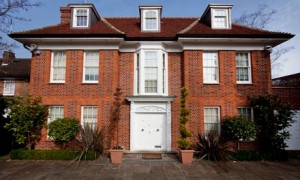 Luxury home with pool and cinema was bought by playboy son of late dictator just six months before Arab spring began.
Luxury home with pool and cinema was bought by playboy son of late dictator just six months before Arab spring began.
The Gaddafis spent four decades plundering Libya, amassing private jets, fast cars and expensive properties the world over. But next week could see what international corruption experts say is the first repatriation of a major asset owned by the deposed Libyan rulers.
On Friday, at the high court in London, the Libyan state will attempt to seize from Saadi Gaddafi, the playboy son of the dead dictator, 7 Winnington Close, a Hampstead Garden Suburb mansion in a quiet cul-de-sac worth in excess of £10m.
The neo-Georgian, eight bedroom home complete with indoor swimming pool and private cinema was bought by the high-living 38-year-old former footballer six months before start of the Arab spring. Glentree, the estate agent that sold him the property, said he decided to buy it after a “quicker than normal” viewing.
Saadi owns 7 Winnington Close through Capitana Seas Ltd, a British Virgin Islands (BVI) company. It is understood that Capitana’s lawyers will not defend the application for repatriation, which could mean the house reverts to Libya on Friday.
But Saadi’s legal representative, Nick Kaufman, a lawyer based in Jerusalem, told the Bureau of Investigative Journalism: “This is an issue of which my client and I are fully aware. My client is at present considering the legal options open to him to tackle this meritless claim.”
Libyan investigators say they were unable to establish Saadi as the owner of 7 Winnington Close until the British Treasury intervened. Treasury officials directly contacted authorities in the BVI, which is famous for protecting the identities of the ultimate beneficiaries of companies based there.
The lawyer hired by the Libyan embassy to handle the groundbreaking case is Mohamed Shaban. He said he had had to establish that Saadi could not have bought the property on his official military wage of £34,000 as commander of Unit 48 in the Libyan ministry of defence. “It would be impossible for him to make £10m in cash,” Shaban said.
“This is hugely significant,” said Robert Palmer, an anti-corruption campaigner at Global Witness. “It looks as if it’s the first asset recovery case related to the Arab spring in London. It is a very complicated process requiring a significant degree of co-operation to identify an asset that is suspected of corruption and then take a case through the courts.”
Shaban said he was looking at several other properties in London which could form the next phase of investigations.
A senior asset recovery expert at a global institution said London’s private banks, desirable properties and luxury shopping made it a prime location for corrupt politicians and their families.
On Monday, James Ibori, a former governor of an oil-producing Nigerian state, pleaded guilty in a British court to 10 counts of money-laundering and conspiracy to defraud. British police accuse him of stealing £160m over eight years. Some £22m of his alleged UK assets were frozen in 2007.
Senior asset recovery specialists suggest the process of repatriating money, property and other investments from fallen Arab dictators has been slow. So far the sum total of assets returned to Arab spring countries amounts to two planes that belonged to Tunisia’s former president, Zine al-Abidine Ben Ali, and his brother-in-law.
A leading London-based investigator involved in the repatriation of assets associated with the Egyptian former Mubarak regime said: “These people have been in power for years and it will take years to unravel. We have seen in recent cases how they use corrupt lawyers and accountants [to move money].”
The investigator pointed to the case of Sani Abacha, the former president of Nigeria who in the mid-1990s is estimated to have siphoned as much as $5bn from the oil-rich country he ruled for five years. “We are still finding Abacha money 14 years after he died.”
It is said that Egyptian investigators have sent out “blanket requests” for stolen assets which have overwhelmed banks. A lack of co-ordination between newly established agencies has seen needless duplication of requests.
There are also reports of tensions and mutual mistrust between western banks and the Libyan central bank, which is leading attempts to track Gaddafi’s assets.
(Source http://www.guardian.co.uk/world/2012/mar/02/libya-acts-seize-gaddafi-house-london)


